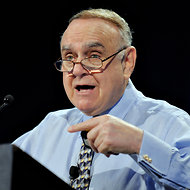The Agenda
How small-business issues are shaping politics and policy.
President Obama may have won a decisive reelection victory, but it is John Boehner, the Republican speaker of the House, who is making the rounds and claiming a mandate. And everywhere he goes, he’s talking about what would happen to small businesses if the Bush-era tax cuts on the wealthiest Americans are allowed to expire. To ABC News’s Diane Sawyer, Mr. Boehner said, “Raising taxes on small-business people is the wrong prescription given where our economy is.” He told USA Today, “Raising taxes on small businesses will kill jobs in America. It is as simple as that.”
In a statement to reporters the day after the election, Mr. Boehner made what some observers described as a concession: House Republicans would consider new revenue as part of a deal to avert the “fiscal cliff.” But he then explained that the new revenue could not come from higher tax rates. “In the New Testament, a parable is told of two men. One built his house on sand; the other built his house on rock,” he said. “The foundation of our country’s economy — the rock of our economy — has always been small businesses in the private sector. I ran one of those small businesses, and I can tell you: raising small businesses’ taxes means they don’t grow.”
To support the claim, Mr. Boehner turned to the same controversial Ernst Young study on which Mitt Romney relied in the first presidential debate in Denver.
Of course, this view is no less controversial now than it was at the time of that debate. Since the debate, we’ve learned about a September report (pdf) from the nonpartisan, and respected, Congressional Research Service, which surveyed the historical record and found that “the reduction in the top tax rates have had little association with saving, investment, or productivity growth” — but “appear to be associated with the increasing concentration of income at the top of the income distribution.” The Congressional Research Service withdrew the report after Republican senators complained.
Then, last week, a report from the Congressional Budget Office seemed to suggest that raising the tax rates on the wealthiest Americans would have little effect on economic output in the fourth quarter of 2013.* Extending the top tax rates would cost the economy 200,000 jobs, according to the C.B.O., an estimate well below the 700,000 jobs that Ernst Young predicted would be lost. In fact, the C.B.O. figures show that while raising taxes (on everybody) amounts to about two-thirds of the total deficit reduction in 2013, it has a much smaller effect on gross domestic product, the measurement for output. (The C.B.O. report relies in part on economic modeling, much like the Ernst Young study, meaning that the C.B.O.’s assumptions about the relationship between taxes and economic output informed the results.)
And Agenda readers who own small businesses have weighed in as well. Jed Horovitz in New Jersey wrote, “Each year, I decide how much money to re-invest in my company and how much to take out. Because I pay taxes on my profit, I always look for productive ways to invest in my company first. Spending pretax money makes sense. If my taxes were lower, I would take more money out and just put it in the bank.”
Carol Gillen, who described herself as “the wife and bookkeeper of a small-business owner” in New York, said, “Demand drives hiring, not the personal income tax of the owner.”
But The Agenda would like to hear from more business owners. We want to take a close look at how you and your companies would be affected by increasing the top tax rates, including how it might affect hiring and investment plans. It would be an intensive profile — we would want to talk through specifics on revenue, income, taxes and investments. (We have made the same request to the National Federation of Independent Business and the S Corporation Association of America, both of which strongly oppose any income tax increase.)
It’s a lot to ask, we know, but it’s an important issue. If you own such a company and have employees — making you a job-creator — and you’re game, please drop us a line to let us know you’re interested.
*More precisely, the C.B.O. report said that extending all of the Bush tax cuts and fixing the Alternative Minimum Tax so that it does not reach deeper into the middle class would add about 1.4 percent to the nation’s gross domestic product in the fourth quarter of 2013. Meanwhile, fixing the Alternative Minimum Tax and extending all of the Bush tax cuts except for wealthier Americans would add about 1.3 percent to G.D.P., so the additional G.D.P. attributed to extending the tax cuts for the top two tax brackets amounts to one-tenth of 1 percent.
Article source: http://boss.blogs.nytimes.com/2012/11/12/will-higher-taxes-affect-small-businesses-you-tell-us/?partner=rss&emc=rss

